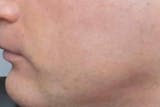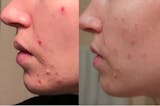Diet significantly impacts the severity and frequency of eczema flare-ups by affecting the immune system and skin barrier health.
The Eczema Elimination Diet helps identify food triggers. The Eczema Diet aims to reduce inflammation and support overall skin health.
Eczema affects millions of individuals globally. It is a recurring skin condition typified by red, itchy, and inflamed skin outbreaks. The degree and length of these flare-ups are influenced by three key factors:
One significant factor that influences the immune system, provides nutrients to the skin barrier, and may be a pathway for triggers, is the food we consume. What we eat can significantly influence the severity and frequency of eczema flare-ups.
In this article, we will delve into the relationship between diet and eczema symptoms, shedding light on the foods that can either exacerbate or alleviate these symptoms.
By understanding how food impacts eczema, you can make more informed dietary choices.
JUMP TO SECTION:
The Role of Food & Nutrition in Eczema Suffering
Food is more than just fuel for our bodies. It is a complex blend of vitamins, minerals, and other nutrients, all of which play vital roles in our overall health, including our skin's health.(FIS 2012)(CHA 2021) Every bite we take is an opportunity to nourish our cells and our gut microbiome, which in turn, impacts their functionality and our overall well-being.
Research indicates that certain skin conditions, including eczema, often coexist with an imbalance in the gut microbiota, a phenomenon known as gut dysbiosis.(PES 2021) This highlights the integral connection between our gut health, mental wellness, and skin health, often referred to as the gut-skin-brain axis.
A healthy gut contributes to a healthy body and mind, and by extension, healthier skin. For a deeper understanding of specific foods as triggers and the connection between the immune system and eczema, we recommend our articles on "Food" and "Allergies and Intolerances".
In the following sections, we'll explore foods that may help soothe the skin, suggest an eczema-friendly diet plan, and offer you a comprehensive roadmap to dietary options in the management of eczema.
Do Any Foods Help Alleviate Eczema Symptoms?
Though people respond differently to various diets, a great starting point for those with eczema is to prepare home-cooked meals with fresh and whole foods.
Focus on consuming a diverse range of colorful vegetables, and minimize intake of sugary or foods rich in refined oils.(CHA 2021)(CHA 2020) The adage "healthy body, healthy mind" rings true when it comes to managing eczema through diet.(SMI 2022)(ARC 2010)
Beneficial Nutrients
There are numerous nutrients that can benefit individuals with eczema. For instance, Omega-3 fatty acids have been shown to improve skin hydration. Vitamin D supplementation can assist those with food or aeroallergen sensitization, and those prone to frequent bacterial skin infections.(SCH 2016)
A study even found that reduced Vitamin D intake during pregnancy increases the likelihood of a child developing atopic eczema.(NAK 2019) Additionally, topically applied Vitamin C may enhance collagen production, while collagen supplements, which are more bioavailable than whole foods, improve skin water retention and decrease inflammation in eczematous skin.(NUS 2001)(BOR 2014)(TAK 2021)(HAK 2017)
A table detailing the benefits of various nutrients for eczema can be found below.
The Good Stuff |
Benefits |
Alkalising food |
Acid-Alkaline balance is essential for a healthy liver. Healthy liver is necessary to filter the blood. Modern diet is very acidic; therefore, it is often necessary to boost alkalising foods in one's diet. |
Omega-3 |
Omega-3 is an essential fatty acid – meaning the body needs it but cannot manufacture the compound so it must come from your diet. Modern diets are lack sufficient Omega-3 therefore it is often necessary to boost Omega-3 intake. Omega-3 has been shown to improve skin hydration. |
Vitamin B6 |
Helps to boost the detoxification of chemicals such as salicylates (see the bad stuff below) and natural antihistamine |
Vitamin C |
Essential for collagen formation in the skin; guards against infection; amine/histamine-lowering. Topically applied Vitamin C may improve collagen production (NUS 2001) |
Vitamin D |
Essential for immune function – deficiency is often found in eczema sufferers |
Vitamin E |
The predominant antioxidant in skin; decreases IgE (marker for immune system activity) while improving immune response; reduces proinflammatory lipids |
Vitamin K |
Essential in skin healing process |
Magnesium |
Amine/histamine-lowering |
Carotenoids |
Potent antioxidants which can modulate gene activity to protect against inflammatory damage and tumor growth; can improve skin hydration |
Lycopene |
Helps to protect skin from sun damage |
Glycine |
An amino acid which is required to produce connective tissue |
Collagen |
A major building block for your skin |
Quercetin |
Lowers blood histamine levels |
Folate |
Helps to generate healthy cells |
Silica |
Strengthens connective tissue |
Soluble Fiber |
Promotes gastrointestinal health |
Zinc |
Vital for skin repair and maintenance |
Calcium |
Can improve skin resilience and hydration while decrease itch |
Potassium |
Combats inflammation |
Anthocyanins |
Can help to protect skin from sun damage |
Iron |
Important for healthy skin |
(FIS 2012)
Beneficial Foods
While there is no one-size-fits-all approach to the perfect diet for eczema sufferers, some foods have been found to be generally beneficial. Examples of these foods include bananas, papaya, broth, potatoes, sweet potatoes, buckwheat, mung bean sprouts, oats, linseeds, red cabbage, spring onions, beetroot, and fish.
Your diet does not need to be limited to these ingredients, but it's worth browsing for some recipes that include them.
Here is a list of foods which are beneficial to your diet:
Good Foods |
The Good Bits |
Banana |
Alkalising, Salicylate free, magnesium, Vit C |
Papaya |
Alkalising, carotenoids, lycopene, Vit C, but moderate amines |
Broth |
Glycine, Calcium, magnesium, collagen, calcium |
Potato |
Alkalising, Vit C, B6, soluble fiber |
Sweet Potato |
Alkalising, Vit C, B6, beta-carotene, magnesium, choline, calcium |
Buck Wheat |
Quercetin |
Mung bean sprouts |
Alkalising, Magnesium, Vit K & C, Folate, salicylate-free |
Oats |
Vit E, zinc, potassium, iron, silica, soluble fiber |
Lin/flaxseeds |
Omega-3, silica, vit E |
Red cabbage |
Vit C, folate, anthocyanins |
Spring onion |
Quercetin, folate, vit C & K, beta-carotene, carotenoid |
Beetroot |
Alkalising, folic acid, iron |
Fish |
Vit D, Omega-3 |
(FIS 2012)
More Dietary Considerations: Hydration and Reducing Alcohol
Hydration is another critical factor for people with eczema. Drinking enough water helps to keep your skin hydrated from the inside out. Aim to drink at least eight glasses of water a day.
Alcohol, on the other hand, can be a trigger for some people with eczema. It can dehydrate the skin and may also interfere with the effectiveness of medications or treatments. If you do choose to drink alcohol, try to do so in moderation and ensure you're also consuming plenty of water.
How to Make Changes To Your Diet
If you are thinking about making change to your diet to improve or manage eczema symptoms, follow these steps to create a personalized action plan:
Start by keeping a food diary or tracking sheet to log your progress and help determine which foods are helping and which are not.
Consider making incremental changes to your diet instead of drastic ones, as they are easier to implement and maintain.
Cook more home-cooked meals with whole foods to have control over the ingredients you consume.
Identify and manage foods that could trigger your eczema.
Try an elimination diet, replacing eliminated foods with balanced alternatives.(ROK 2009)
Remember that each person's experience with eczema is unique, and it may take some trial and error to find the dietary adjustments that work best for you. Do not be discouraged if you don't see immediate results; it takes time to determine which foods positively or negatively impact your eczema symptoms.
It is always a good idea to work with a healthcare provider or a registered dietitian to develop a dietary plan tailored to your specific needs and symptoms.
Below we cover two popular diets that you might work on with a healthcare provider.
The Eczema Elimination Diet
An elimination diet is a dietary approach designed to identify potential food triggers that may be exacerbating eczema symptoms. Common culprits include dairy, gluten, eggs, nuts, soy, and nightshades, among others.
Foods which affect gut permeability should be avoided.(PES 2021) Food allergies linked to skin conditions.(PES 2021)
See our pages on food triggers and allergies and intolerances for more on the foods to watch out for in your elimination diet.
Here's an overview of how to implement an elimination diet:
How An Elimination Diet Works
An elimination diet involves removing potential food triggers from your diet for a period of time, typically 2-4 weeks. During this time, you'll track your symptoms to see if they improve. After the elimination phase, you'll gradually reintroduce the eliminated foods one by one to see if they cause eczema symptoms.
Steps to Implement An Elimination Diet
Here are the steps to follow when implementing an elimination diet:
Identify potential food triggers: Based on your food journal or allergy testing, identify the foods that may be triggering your eczema symptoms.
Remove potential food triggers from your diet: Remove all potential food triggers from your diet for 2-4 weeks.
Track your symptoms: During the elimination phase, track your eczema symptoms to see if they improve.
Reintroduce eliminated foods: After the elimination phase, gradually reintroduce eliminated foods one by one to see if they cause eczema symptoms.
Identify trigger foods: If a particular food causes eczema symptoms, it should be avoided in the future.
Tips for success
Tips for success
Work with a healthcare professional: A healthcare professional, such as a dermatologist or allergist, can help you identify potential food triggers and develop a plan for implementing an elimination diet.
Plan ahead: Meal planning and preparation can be challenging during an elimination diet, so it's important to plan ahead and have healthy, eczema-friendly meals and snacks on hand
Keep a food journal: Keep a journal to track which foods you're eliminating and reintroducing, as well as any symptoms you experience
Be patient: Results from an elimination diet can take time, so it's important to be patient and stick with the process.
Alternatively, a less extreme method is to cut certain foods out for specific periods of time while tracking your skin health, and use a food diary to determine which foods might be contributing to your eczema symptoms.
It is essential to maintain a balanced diet while making these changes, and remember that what works for one person may not work for everyone. Particularly in children, any dietary changes should be implemented carefully and in combination with other therapies.(SCO 2015)
The Eczema Diet
If you prefer a more general approach, you can try the eczema diet instead. The eczema diet is designed to reduce inflammation and support overall skin health. It focuses on consuming anti-inflammatory foods and avoiding potential trigger foods.
By following the eczema diet, you can experience benefits such as reduced inflammation, improved gut health, and better skin health, leading to a decrease in eczema symptoms.
Foods to Include in the Eczema Diet
The eczema diet emphasizes whole, nutrient-dense foods such as fruits, vegetables, lean proteins, and healthy fats. Some specific foods that are beneficial for eczema include:
- Fatty fish, such as salmon and mackerel, which are high in omega-3 fatty acids that can reduce inflammation
- Leafy greens, such as spinach and kale, which are rich in vitamins and minerals that support skin health
- Probiotic-rich foods, such as yogurt and kefir, which can improve gut health
- Fruits and Vegetables: Foods like kale, spinach, cherries, and apples are high in antioxidants and flavonoids that can help reduce inflammation and promote skin health.
- Whole Grains: Foods like brown rice, oatmeal, and whole grain bread are high in fiber and can support a healthy gut microbiome, which is important for managing eczema.
- Healthy Fats: Avocados, nuts, and seeds are high in healthy fats and vitamin E, which can promote skin health and reduce inflammation.
Foods to Avoid on the Eczema Diet
The eczema diet recommends avoiding processed foods, sugary foods, and foods that may trigger eczema symptoms.
Some specific foods to avoid include:
Dairy products, which can be difficult to digest and may trigger eczema symptoms in some individuals
Gluten-containing grains, such as wheat, barley, and rye, which can trigger an immune response in some people
High-sugar foods, such as candy and soda, which can cause inflammation and disrupt gut health
Learn More About Diet and Nutrition for Eczema
While some foods may improve eczema, others can trigger or worsen its symptoms. By understanding the connection between diet and eczema, keeping a food diary, and making gradual changes to your eating habits, you can take control of your eczema and work towards a healthier, more comfortable life.
If you'd like to learn more about diet and nutrition for eczema, we invite you to explore the resources mentioned in this blog post and continue your journey towards understanding how your diet can help or hinder your eczema symptoms.
Share your experiences with us! Tell us what has and hasn’t worked for you. What did we miss in this article that you've found personally impactful? Your insights can help others better understand and manage their eczema.



